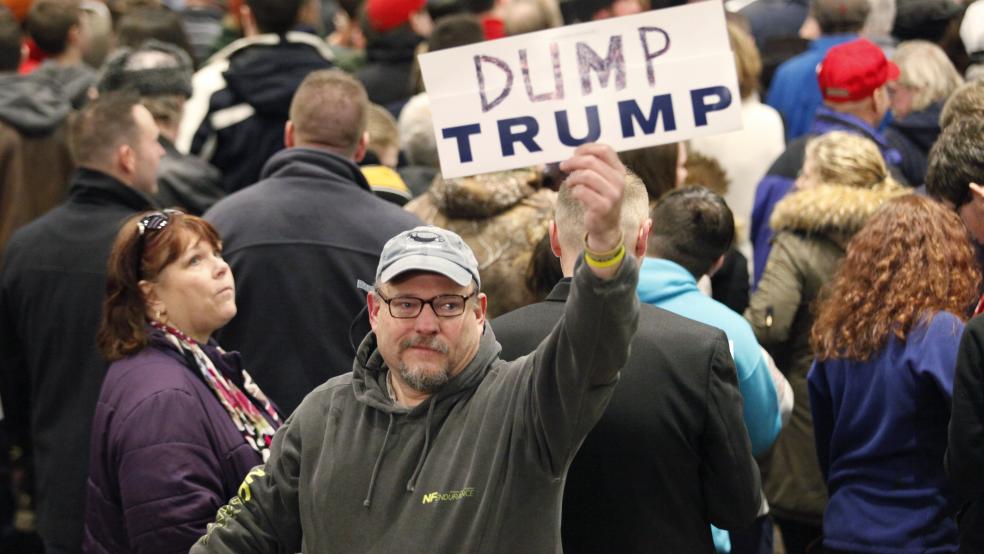The Washington Post Thursday night published a widely cited piece by Philip Rucker reporting on the level of resignation among Republican Party insiders to the idea of Donald Trump winning the party’s presidential nomination. Indeed, with six straight victories in recent primaries, a substantial delegate lead and favorable polling in the key state of Indiana, the New York billionaire’s nomination looks almost assured.
“Republican stalwarts opposed to Trump remain fearful of the damage the unconventional and unruly billionaire might inflict on the party’s down-ballot candidates in November,” Rucker wrote. “But many also now see him as the all-but-certain nominee and are exhausted by the prospect of a contested July convention, according to interviews this week with more than a dozen party figures from coast to coast.”
Related: Trump’s Foreign Policy Speech Left Experts Puzzled, or Appalled
There’s no question that many or even most Republicans would rally around Trump as the party’s nominee if he wins the 1,237 delegates necessary to secure the nomination at the Republican convention in July. Some will get behind Trump just because he is the GOP nominee. Some will fall in line in spite of Trump being the nominee, in order to do their best to protect down-ballot Republicans from general election disaster in the event of a catastrophic loss in the presidential campaign.
But there is a very big question about how many will do neither.
On Friday, with the primary in his state just days away, Indiana Gov. Mike Pence finally stepped off the sidelines and endorsed Texas Sen. Ted Cruz instead of Trump. Pence had been criticized for failing to take a stand on such a key race, but in the end, even with Trump polling ahead of Cruz by more than 5 percentage points in Indiana, he apparently refused to surrender to the inevitability of a Trump nomination.
Pence is not alone in declining to surrender to a Trump candidacy, and many of his fellow conservatives have been much more vocal about it. For months, the so-called #NeverTrump movement has been actively opposing the former reality television star’s candidacy on the grounds that Trump is not worthy of leading the Republican Party.
Related: John Boehner on Ted Cruz – ‘Lucifer in the Flesh’
Even as a Trump nomination looks more and more like a sure thing, at least some are glad to clarify that their position has not changed.
“The Trump campaign is a test of character, and many Americans are failing it,” Tom Nichols, a professor at the Naval War College, wrote this week at The Federalist.
A staunch conservative and strong critic of the presumptive Democratic nominee Hillary Clinton, Nichols nevertheless wrote, “Yes, fellow conservatives: Trump is worse than Hillary Clinton or Barack Obama. Their policies are liberal, even leftist, often motivated by cheap politics, ego, and political grandstanding. But they are policies, understandable as such and opposable by political means.”
Trump’s positions, he said, are not so much policies as “feverish revenge fantasies...inviting us into a war of all against all over which he will preside as an amused dictator.”
Related: Trump Plays the ‘Woman Card’ Against Hillary. Will It Backfire?
He added, “Most conservatives have already told Trump that we will not sell our character as Americans, and indeed our very souls, just to feel the pleasure of resentful anger for a few months.”
In The New York Times on Friday, conservative columnist David Brooks damned his fellow Republicans who seem willing to fall in line behind Trump.
“They’re going down meekly and hoping for a quiet convention,” he wrote. “They seem blithely unaware that this is a Joe McCarthy moment. People will be judged by where they stood at this time. Those who walked with Trump will be tainted forever after for the degradation of standards and the general election slaughter.”
The question that the GOP as a whole now has to face is just how widespread the feelings of alienation Trump inspires really are and how that will affect the party in November. Maybe it’s unlikely that committed conservatives like Nichols and Brooks will skip the election altogether, allowing down-ballot Republicans to suffer because of their antipathy toward the man at the top of the ticket. But whether that can be said for the majority of the Republican voters unhappy with The Donald is not at all clear.
Related: Trump Keeps Defying Predictions -- And His Own Advisers
And that’s causing some obvious concern.
On Friday, for example, Oregon Rep. Greg Walden, the chair of the National Republican Congressional Committee, felt the need to assure fellow Republican that the GOP will maintain its majority in the House of Representatives in the next Congress. A few months ago, that would have been about as necessary as promising that the sun will rise tomorrow.
If Trump really does become the nominee, the onus will be on the GOP establishment to solve the problem of how to mount an effective get-out-the-vote operation in November, even as a significant segment of their voters are, as Brooks put it, “appalled” by Trump.





